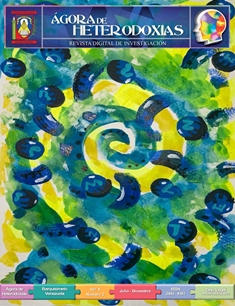Pedagogy of love, happiness and playfulness
Trilogy to project humanizing horizons from education
Keywords:
Pedagogy of love, pedagogy of happiness, playfulness, training in values, humanizationAbstract
The pedagogy of love, joy and play is theoretically constructed as an integrative statement-category with pedagogical, psychological and ethical-political notions, which implies thinking of education as a space for strengthening humanizing processes that tend to form values, based on which are potentiated to generate transforming systemic effects. This statement has important repercussions on pedagogical practices, making the school a space for the recognition of subjects, valuing not only the cognitive, but also the affective and existential. The methodology is based on a qualitative approach, of the analytical and documental type, on traits exposed by pedagogues that point to the notion of the pedagogy of love, also including references of joy and play. In conclusion, actions are projected and consider that teachers must implement to ensure the learning processes in articulation with educational communities. Also considers the consequences that may have in the transition from a traditional pedagogy to one that seeks the integral development of the human being and belonging to a society in constant evolution, contributing to the formation of their own personality with affective principles, from which happiness, love and play become a fundamental part of their lifelong learning.
Downloads
References
Arboleda, Z., Herrera, M., & M, P. (2017). ¿Qué es educar y formar para la paz y cómo hacerlo? Educación y Pedagogía para la Paz- Material para la práctica. En Z. Arboleda, M. Herrera & P. M, ¿cuáles enfoques pedagógicos promueven una educación para la paz? (págs. 11-17). Bogotá: ARKO Consulta S.A.S.
Blanco, N., Ballarin, P., Altable, R., Fuentes-Guerra, M., Huertas, P., García, L., Puleo, A. (2001). Educar en Femenino y en Masculino. Madrid: Akal.
Calcutt, A. (2015). San Juan Bautista de la Salle: La educación libera a los pobres, Vol. I y II. Bogotá, Colombia. Ediciones Unisalle.
Carter, C (2012), El aprendizaje de la felicidad; 10 pasos para fomentar la felicidad en los niños y en sus padres, Editorial Urano, Barcelona, España. Delors.
Gadotti, M. (2007). Paulo Freire contribuciones para la pedagogía. México: 1a Ed México Consejo Latinoamericano de Ciencias Sociales.
Gallegos, R (2012), La felicidad como realidad educativa, aprendiendo a Ser Feliz, Fundación Internacional para la Educación Holista, Guadalajara, México.
Goicoechea, M., & Fernández, O. (2014). Filosofía y educación afectiva en amor y pedagogía, De Unamuno. Ediciones Universidad de Salamanca. https://gredos.usal.es/handle/10366/131209
Hernández-Hernández, O (2016) Incluir desde lo amoroso: una mirada desde la pedagogía del amor y paz Ra Ximhai, vol. 12, núm. 3, enero-junio, 2016, pp. 261-269 Universidad Autónoma Indígena de México El Fuerte, México. https://www.redalyc.org/pdf/461/46146811017.pdf
Lyubomirsky, S (2011), La ciencia de la felicidad, un método probado para conseguir el bienestar, Editorial Books4pocket, Barcelona, España.
Matthieu, R (2012), En defensa de la felicidad, un auténtico tratado de la felicidad, a la vez que una valiosa y convincente guía para nuestros individualismos carentes de puntos de referencia, Editorial Urano, Barcelona, España.
Monteverde, (2013). Pedagogía del amor en el contexto de la educación venezolana en el siglo xxi: hacia un fortalecimiento de la ciudadanía. Didáctica y Educación. https://dialnet.unirioja.es/descarga/articulo/6581790.pdf
Montessori, M. (1965). Spontaneous Activity in Education. New York: Schoken Paperback.
Novoa, A. (2013). El exilio: vocación a la transparencia y a la verdad. En A. Novoa, a vocación alcanza su plenitud en el amor. Bogotá: Universidad de la Salle.
Ortiz, A., Sánchez, J. y Sánchez, I. (2015, enero-julio). Los modelos pedagógicos desde una dimensión psicológica-espiritual. Revista Científica Gen. José María Córdova 13(15), 183-194. http://www.scielo.org.co/pdf/recig/v13n15/v13n15a07.pdf
Van, A. (2005). From special to new education: the biological, psychological, and sociological foundations of Ovide Decroly´ educational work (1871-1932). History of Education. https://eric.ed.gov/?id=EJ719670
Veugelers, W. (2017). The moral in Paulo Freire’s educational work: What moral education can learn from Paulo Freire. Journal of Moral Education. https://eric.ed.gov/?id=EJ1155189
Published
How to Cite
Issue
Section
Copyright (c) 2021 Ágora de Heterodoxias

This work is licensed under a Creative Commons Attribution-NonCommercial-ShareAlike 4.0 International License.
![]() Authors keep their copyrights so articles can be reused for teacher and research purpose. Readers and users can also reuse articles for the same purposes but not for commercial purposes. Ágora de Heterodoxias has no responsibility on information given by collaborators which is not necessarily the point of view of the publication
Authors keep their copyrights so articles can be reused for teacher and research purpose. Readers and users can also reuse articles for the same purposes but not for commercial purposes. Ágora de Heterodoxias has no responsibility on information given by collaborators which is not necessarily the point of view of the publication



